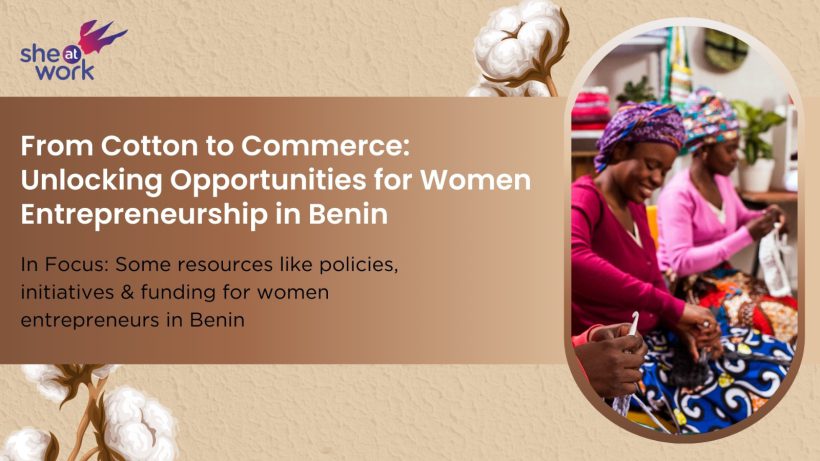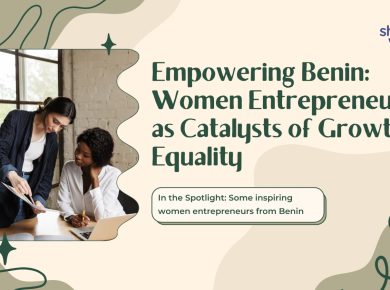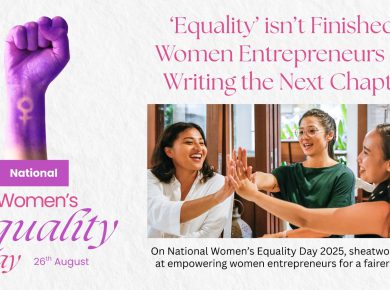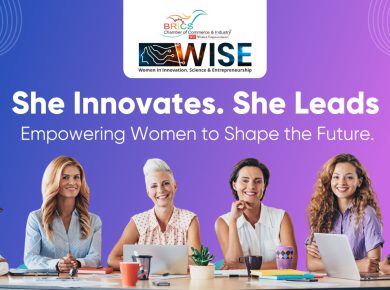In Focus: Some resources like policies, initiatives & funding for women entrepreneurs in Benin
#SheTrades #WomenInAfrica #BeninGrowth #BeninEntrepreneurs #EmpowerHer
Benin notably carries the name “The Birthplace of Voodoo”. And, this intriguing nickname reflects the country’s deep-rooted spiritual heritage and the practice of Voodoo, which has shaped its culture for generations.
Benin, often hailed as one of West Africa’s most resilient economies, has shown remarkable growth in recent years. With GDP growth averaging over 6% since 2017, driven by cotton production, trade & services, the nation is steadily expanding its economic footprint. Yet, beneath this positive trajectory lies a stark reality: women, who represent a significant share of the workforce, remain concentrated in vulnerable, informal employment. In 2022, over 82% of women were engaged in precarious work, limiting their ability to benefit fully from Benin’s economic progress.
Benin’s Future: Women Entrepreneurs Driving Inclusive Prosperity
Recognizing the untapped potential of women entrepreneurs, Benin has increasingly turned to targeted schemes, initiatives & policies aimed at addressing these gaps. From financial inclusion programmes and access-to-credit initiatives to training workshops and government-backed projects within the Glo-Djigbé Industrial Zone (GDIZ), women are being equipped with tools to move beyond subsistence activities and move into scalable, sustainable enterprises.
International partners, development banks & grassroots organizations are also stepping in, offering mentorship, microfinance, and digital literacy programmes tailored for women entrepreneurs. These resources not only foster economic independence, but also contribute to poverty reduction and inclusive growth.
Let us now explore the evolving landscape of resources shaping women’s entrepreneurship in Benin.
- Women’s Entrepreneurship for a Greener Economy in Benin (IIW-Benin) programme
Women’s Entrepreneurship for a Greener Economy in Benin (IIW-Benin) programme is funded by Global Affairs Canada (GAC) and implemented by AECF. It aims to economically empower women entrepreneurs in high-impact climate-positive sectors, including technology innovation, digital technology, small-scale agriculture, production, processing, craftsmanship & trade. By addressing the barriers that limit their ability to grow their businesses, the programme seeks to enhance women’s participation in economic development.
As part of this programme, PEBCO BETHESDA and RENACA-Benin secured funding and technical support; and this will expand women’s access to financial services, strengthen their economic participation, and support the transition to a greener economy.
Through this support, PEBCO BETHESDA will implement the Financing Women’s Entrepreneurship for a Greener Economy in Benin project – providing financial and non-financial support to women and women-led micro and small enterprises. The initiative will help integrate climate-smart techniques and practices into business operations and includes the opening of new branches in northern Benin – to improve financial access for women entrepreneurs in the region.
Through their funding, RENACA-Benin will implement the Financing of Women’s Resilient Agricultural Activities project, which will support women’s groups and women-led micro and small enterprises – through tailored financial and non-financial services. Significantly, the project focuses on developing climate-resilient and sustainable agricultural activities and establishing a guarantee fund to help women entrepreneurs access additional capital.
- FEMMPACT II
FEMMPACT II is all about promoting women entrepreneurship. Women in West Africa launch businesses but they continue to face significant barriers. Most importantly, economic systems in this region often restrict their ability to secure essential funding, access markets, and build business networks. Cultural expectations and social norms further limit their opportunities, while many struggle to find relevant training to enhance their entrepreneurial skills.
Although support programmes exist, most fail to address women’s specific needs. Consequently, women entrepreneurs in Mauritania, Benin & Togo encounter blockages in their business growth and broader economic participation.
The objective is that women entrepreneurs in Mauritania, Benin, and Togo have found a supportive environment to start, grow, and innovate in their businesses.
The project pursues three main measures.
i) It trains representatives from nine entrepreneurship support organizations and incubators in Mauritania Benin, and Togo through workshops in Morocco with experts from Morocco and Germany. Participants build skills, share experiences, and co-design a dedicated support programme and toolkit tailored for women entrepreneurs.
ii) The project supports 100 women entrepreneurs in Mauritania, Benin, and Togo with tailored training, peer-to-peer exchanges, and networking opportunities. Eighteen selected women join an intensive learning journey in Morocco to gain advanced support and insights.
iii) It expands the regional network for women’s entrepreneurship to promote the exchange of best practices among African support organizations and build connections with German partners.
FEMMPACT II builds on the achievements of the first edition, implemented in Senegal and Côte d’Ivoire – to expand its network and strengthen its impact in other West African countries, with the goal of fostering more inclusive ecosystems that support female innovation and entrepreneurship.
This triangular cooperation project brings together the strengths of the three partner regions, drawing on German and Moroccan expertise to support women’s entrepreneurship in Mauritania, Togo, Benin. It focuses on strengthening entrepreneurial ecosystems dedicated to women-led initiatives, providing tailored support to female entrepreneurs, and fostering networking among entrepreneurship support structures.
https://www.giz.de/en/downloads/giz2025-en-promoting-female-entreneurship-femmpact-ii-fact-sheet.pdf
https://www.giz.de/en/worldwide/143541.html
- AECF
Investing in Women’s Entrepreneurship for a Greener Economy in Benin and Burkina Faso is a six-year gender equity and economic inclusion programme implemented by AECF with funding from Global Affairs Canada.
The Programme aims to economically empower women as entrepreneurs in sectors with a high positive impact on the climate in the fields of technological innovation, digital technology, small farmers, producers, processors, handicraft and trade – in order to remove the barriers that prevent them from contributing to the development of their activities.
Since their launch in 2008 at the World Economic Forum, AECF has built the resilience of rural and marginalized communities by catalyzing innovative private sector business models with patient capital and growth support services across Sub-Saharan Africa.
- Women’s Entrepreneurship for a Greener Economy in Benin
This is part of a movement to grow green companies owned by women. Women’s Entrepreneurship for a Greener Economy in Benin (IFEV-Benin) was set up by the Africa Enterprise Challenge Fund (AECF).
The programme is meant to economically empower women as entrepreneurs in sectors with high climate positive impact. These include technological innovation, digital technology, smallholder farming, production, processing, crafts & commerce.
The Investing in Women’s Entrepreneurship for a Greener Economy in Benin (IFEV-Benin) programme was recently launched by the Africa Enterprise Challenge Fund (AECF).
https://www.esi-africa.com/women-in-energy/benin-programme-to-grow-green-companies-owned-by-women/
- The UX in Climate programme
The UX in Climate programme innovates by adopting a multidisciplinary approach, which is a first for initiatives of this kind. It brings together 160 women entrepreneurs (80 per cohort) from diverse fields such as technology, engineering, marketing, and business strategy. This diversity goes beyond enriching discussions; it acts as a catalyst for synergy and innovative thinking.
By combining these complementary skills, the programme aims to build a pipeline of innovative solutions and develop stronger, more resilient ventures capable of addressing complex climate challenges. This unique approach transforms diverse expertise into a driving force, fostering sustainable solutions with long-term impact.
A core element of the program is the UX (User Experience) approach, which helps participants design solutions that are tailored to the real needs of their users. There is a correlation between the content of the workshop to real world problems participants face, and it encourages them to be innovative and creative.
It is indeed a platform for the next generation of female leaders
More than just a training programme, UX in Climate aims to boost women’s presence in the tech and climate ecosystem in West Africa. The initiative seeks to develop at least ten high-potential projects that can evolve into impactful businesses by the end of the 2024/2025.
The positive energy and spirit of innovation displayed during the first sessions hint at great progress to come. Through this initiative, CATAL1.5°T reinforces its commitment to inclusive and sustainable innovation by creating an environment where visionary women can collaborate, innovate, and design solutions that will shape the future of climate action in West Africa.
UX in Climate offers women the opportunity to innovate boldly, while inspiring the next generation of female entrepreneurs to tackle climate challenges with creativity and confidence. By combining imagination, expertise, and collaboration, these women are building a future where technology and climate solutions converge for sustainable development.
https://catalist-initiative.eco/news/empowering-women-entrepreneurs-in-west-africa
- Women EdTech
Women EdTech promotes women entrepreneurship in Benin through Digital Technology. Through a diverse range of programmes – from technology camps to the acceleration of small and medium-sized enterprises, Women EdTech offers a fertile ground for the growth of women-led ideas and businesses.
Women EdTech, a digital training center, incubator & accelerator for women, was established in 2017 in Benin – to promote the inclusion of girls and women in the digital sector.
The center’s primary objective is to assist girls and women in enhancing their skills and quickly developing new ones, as well as providing them with more opportunities for business growth. By 2030, Women EdTech aims to create 300,000 jobs and support 30,000 women entrepreneurs and small and medium-sized enterprises (SMEs).
Women EdTech offers a variety of programmes – including training and insertion programs, technology camps, and an academy. It also provides incubation programs such as the Women Developers Academy, Fempreneures, and DigiPreneurs to assist women in developing their businesses.
As an accelerator, Women EdTech offers a Business Growth programme, which is a
3-month SME acceleration programme, which provides specialized support, networking, partnership opportunities, and resources to women who run e-commerce-focused SMEs. The programme aims to help women in Benin’s entrepreneurial ecosystem increase their revenues and visibility through digital tools, as well as scale up, unlock their export potential, and access financing.
Since its inception, Women EdTech has trained over 500 women and established more than 100+ businesses.
- “Miguézé!
“Miguézé! Is an initiative for empowering women farmers in Benin. Since 2016, the project “Initiative for Empowering Women Farmers in Benin – “Miguézé!” has helped rural women in Benin access land, build agricultural and technical skills & gain self-confidence as entrepreneurs.
The project, led by Association Nationale des Femmes Agricultrices du Bénin (ANaF) and funded by UN Women Fund for Gender Equality (FGE), helps establish women’s Savings and Loans Groups and encourages income-generating activities to boost food productivity and security.
Benin is among Africa’s most stable democracies and largest cotton producers. Unfortunately, corruption is alive and despite economic growth over the past few years, Benin ranks among the world’s poorest countries.
Although several recent laws have been adopted to improve women’s rights, implementation comes up against serious social, cultural & economic obstacles. Discriminatory practices negatively impact women’s safety and security, not to mention women’s political and economic participation; and the lack of economic opportunity has exacerbated these impediments to gender equality in Benin.
The reality is that rural women are disproportionately affected by these obstacles, including high illiteracy rates and traditional norms that exclude women from land ownership, inheritance and resource management. They are also vulnerable to climate change and the subsequent degradation of natural resources, and many struggle to meet basic needs for themselves and their households. By helping rural women access, ANaF Benin, with the support of the Fund for Gender Equality, is transforming women’s livelihoods in some of the most remote areas of the country.
Since early 2016, ANaF has implemented the FGE-funded project “Initiative for Empowering Women Farmers in Benin – “Miguézé!”. It has since helped women access land, build agricultural and technical skills, and gain self-confidence as rural women entrepreneurs in two municipalities, Savalou and Bantè.
The Miguezé project operates using a micro-finance service – Savings and Loans Groups (SLGs) – that brings 10 to 35 women together to form a group. They elect a President, a Secretary and a Treasurer, and every week put their savings into a common pool of funds. After a few weeks or months, any of the members can ask for a loan and must repay it within the next three months, paying an interest rate of 5 – 10 per cent. The loan is used to invest in their businesses — for example, for buying seeds, cattle and tools to increase productivity. The interest is divided between the members of the group, so everyone benefits. The loans do not require asset guarantee, which is particularly helpful for small-scale women farmers who often do not own land or assets. Some groups also open a solidarity fund composed of the savings of each member of the group, which can be used in the event of emergencies. These funds are mostly used for school fees and medical bills, and allow the women to take financial decisions in these areas without requiring the approval of their husbands.
ANaF remains committed to the rural women of Savalou and Bantè. As Louisa Aylara, the President of ANaF stated, “What is needed is a women’s organization that gives these women confidence and allows them to communicate freely. We intend to continue supporting the women of Savalou and Bantè, while opening new pathways for women in other communities. We will offer trainings in accounting, literacy and leadership skills. ANaF would also like to continue supporting local and national governments in passing laws to improve women’s access to mobile banking services as well as drinking water and land.”
https://africa.unwomen.org/en/news-and-events/stories/2018/10/we-are-liberated-benin
- Ilé obirin
Ilé obirin, the house of women entrepreneurs of Benin, a non-profit association was officially launched on 26 July, 2022. This was an opportunity for the initiators to launch new members at the headquarters of the organization in Agla in Cotonou. Women now run one third of all businesses in the formal economy worldwide. However, the majority of those operating in developing economies are in very small or medium-sized enterprises with limited growth potential. Beyond the under-representation of women in companies of all sizes, the larger the company, the less likely it is to be headed by a woman. In fact, Ms Neuly Abiala set up an organization called Ilé obirin, the house of women entrepreneurs, as she was aware of the inequalities that women faced; and it was also in response to the isolation and lack of understanding of women entrepreneurs and the various challenges they constantly face.
This association is a group of active women entrepreneurs, both beginners and experts, self-employed, business owners, employees, retirees, housewives from urban and rural areas working from home.
Actually, Ilé obirin is also a “power place” that brings together women entrepreneurs and helps them develop their business and their entrepreneurial spirit. They also aim to be an incubator or a professional women’s network, bringing together all women entrepreneurs, not only from Benin but also from Africa. The idea behind is to put them in touch with each other, to help them gain visibility and to contribute to their development through exchange and mutual support.
- World Bank
World Bank’s mission is to end extreme poverty and boost shared prosperity on a livable planet. This is threatened by multiple, intertwined crises.
Incidentally, there are five institutions that are working together to reduce poverty and promote sustainable development with knowledge, financing, and expertise.
IBRD – International Bank for Reconstruction and Development
IDA – International Development Association
IFC – International Finance Corporation
MIGA – Multilateral Investment Guarantee Agency
ICSID -International Centre for Settlement of Investment Disputes
https://www.worldbank.org/ext/en/who-we-are
- Benin Investment and Export Facilitation Project
The Benin Investment and Export Facilitation Project strengthens digital public services for businesses – by deploying a dedicated online single window to simplify investment and export-related procedures.
It was implemented by the Agence de Promotion des Investissements et des Exportations (APIEx), with technical support from UNCTAD and funding from the Government of the Netherlands.
This initiative complements a broader national strategy to digitalize the public administration and support private sector growth, with special attention to women entrepreneurs.
This digital gateway marks a major leap in Benin’s digital governance and positions the country among the leaders in online investment facilitation in Africa. A strong foundation has now been laid for an inclusive, service-oriented, and smart public administration.
https://digitalgovernment.world/academy/projects/benin-apiex
- TechnoServe – BeniBiz 2.0 Program
International nonprofit TechnoServe recently launched the second edition of the BeniBiz project during a ceremony involving stakeholders from across the Beninese entrepreneurial ecosystem.
BeniBiz 2.0 is a five-year program funded by The Embassy of the Kingdom of the Netherlands (EKN), The Swiss Agency for Development and Cooperation (SDC), and the Delegation of European Union (DUE). BeniBiz 2.0 will scale the approach followed by BeniBiz 1.0, supporting more entrepreneurs, especially young people and women, to increase economic opportunities, employment, and food security while contributing to the green growth of the economy.
BeniBiz 2.0 will have a particular emphasis on supporting young entrepreneurs, as well as women, who are the majority owners of just 19% of Benin’s formal enterprises. To address the impacts of the global food crisis and harness opportunities in agricultural value chains, more than half of the entrepreneurs participating in the program will come from the agri-food sector, such as local food processing businesses.
The program will have a dedicated track to accelerate the growth of green businesses that provide regenerative products and services to their communities. It will also help businesses identify and adopt practices that improve their climate resilience and environmental sustainability.
Through a Market System Development (MSD/M4P) approach, BeniBiz 2.0 will work with local stakeholders to facilitate new and sustainable solutions that will channel access to different tools, products, and services that will help entrepreneurs on their path to success and ensure that benefits last long after the program is completed.
- Rescue and Hope
The Air Liquide Foundation is supporting Rescue and Hope, a Beninese NGO. Rescue and Hope improves the integration of Beninese women into the job market by developing their technical skills in digital and their employability.
And Rescue and Hope has opened a digital training center in Cotonou, Benin – to promote female integration, empowerment & entrepreneurship through digital.
100 women aged 15 to 50 are receiving training to develop their skills, retrain and enter the digital arena.
Three types of training are provided:
- A six-month training course in computing and office automation
- A three-month refresher course in computing
- A nine to 12-month vocational training course in computing to become developers and webmasters
It is important to point out that the training is provided by computer experts.
https://www.fondationairliquide.com/female-inclusion-through-digital-benin










